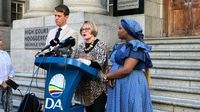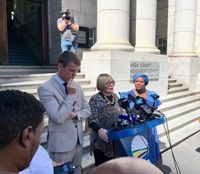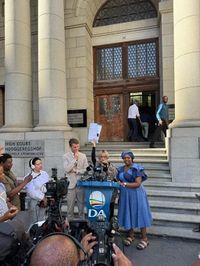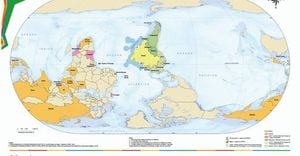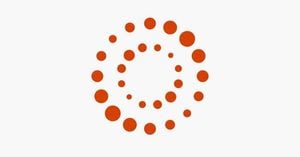The Democratic Alliance (DA) has taken a significant step in the ongoing fiscal debate in South Africa by filing an urgent court application at the Western Cape High Court on Thursday, April 3, 2025. This legal action challenges what the party describes as procedural and constitutional irregularities in the approval of a fiscal framework that is likely to result in an increase in the Value Added Tax (VAT).
DA officials, including federal council chairperson Helen Zille and finance spokesperson Mark Burke, voiced their concerns outside the court, emphasizing that the proposed VAT hike would worsen the already critical cost of living crisis facing South Africans. The staggered VAT increase, proposed by Finance Minister Enoch Godongwana, is set to begin with an initial hike of 0.5 percentage points on May 1, 2025.
The court filing follows a narrow vote in the National Assembly on April 2, where the fiscal framework was approved despite the DA's vocal opposition. The ANC, South Africa's ruling party, managed to secure the budget's approval with the backing of several smaller parties, including ActionSA, Build One South Africa, the Patriotic Alliance, the Inkatha Freedom Party, and the United Democratic Movement. In contrast, the DA, Freedom Front Plus, Economic Freedom Fighters, and Jacob Zuma's uMkhonto weSizwe party voted against the proposal.
At the heart of the DA's legal case are two primary challenges. The first is directed at the process followed by the parliamentary finance committees, which the DA claims was flawed and thus invalidates the adoption of the fiscal framework. The second challenge seeks to declare section 7(4) of the Value Added Tax Act unconstitutional, on the grounds that it improperly grants the finance minister the authority to impose tax increases without full parliamentary approval.
“The DA never only has one plan. We are absolutely determined to stop the VAT hike and we believe this case will expose how the ANC is trying to bypass democratic processes,” Zille stated. She also criticized ActionSA's assurances that they would prevent the VAT hike, labeling such claims as “delusional.”
Zille further elaborated on the DA's motivations for participating in the government of national unity (GNU), stating, “We are not in the GNU for blue lights or cars or ministerial homes or status. We are in that GNU for one sole purpose and that is to get South Africa’s economy to grow at the rate it needs to grow in order to absorb more people into productive employment and thereby reduce poverty.”
She expressed frustration over the ANC's alleged failure to honor coalition commitments, revealing that the DA had proposed a comprehensive economic reform package aimed at stimulating job creation and investment. However, she noted that smaller coalition partners ultimately sided with the ANC, allowing the fiscal framework to pass without necessary conditions being met.
When questioned about the possibility of the DA withdrawing from the GNU, Zille indicated that the party's federal executive would meet to evaluate its options. She reiterated that the DA would not support any budget that places additional financial burdens on South Africans.
The political climate has become increasingly tense, especially after remarks made by President Cyril Ramaphosa during an ANC caucus meeting on April 1. In a leaked recording, Ramaphosa warned that the DA would effectively be leading itself out of the partnership if it chose not to support the fiscal and revenue proposals. Following this, Ramaphosa's office stated that the president is committed to the GNU and values the contributions of DA cabinet ministers, expressing a preference for the DA to remain part of the coalition. However, they emphasized that the budget vote would serve as a test of the DA's commitment to the partnership.
As this legal battle unfolds, market observers are closely watching the DA's next moves, particularly regarding its continued participation in the multi-party government formed last year after the ANC lost its parliamentary majority for the first time since the end of apartheid in 1994. The DA's decision could have significant implications for the stability of the GNU and the broader political landscape in South Africa.
The DA's legal challenge not only highlights the contentious nature of the VAT increase but also underscores the growing divisions within the ruling coalition. With the stakes high and public sentiment increasingly focused on economic pressures, the outcome of this court case may well influence the future direction of South African governance.
